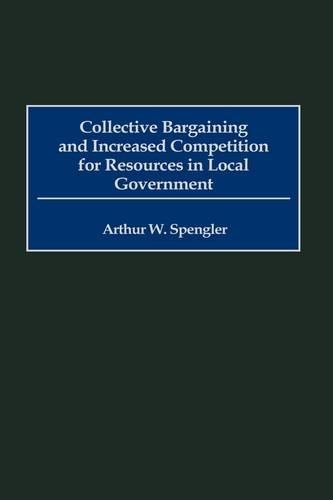
Collective Bargaining and Increased Competition for Resources in Local Government
(Hardback)
Publishing Details
Collective Bargaining and Increased Competition for Resources in Local Government
By (Author) Arthur W. Spengler
Bloomsbury Publishing PLC
Praeger Publishers Inc
30th August 1999
United States
Classifications
Tertiary Education
Non Fiction
Regional, state and other local government
331.89041351
Physical Properties
Hardback
256
Description
Local government employees have a higher propensity to engage in collective bargaining than do private sector employees. This springs from the tight competition in the local budgeting process among those requesting, paying for, and providing services. Spengler looks at this trend using a fiscal discontent hypothesis. This approach suggests that the taxpayer revolts during the 1970s and 1980s limited the budget discretion of elected officials and forced public sector employees to turn to collective voice and action to better compete for scarce public resources. Two levels of employee collective voice are examined: the weaker form of organizing and the stronger collective bargaining model. Substantial differences in the use of each are analyzed based on employee occupation, state, and type of local government. Scholars, business practitioners, policy makers, and researchers in public administration, labor relations, public policy, and local government will find this study an important contribution to understanding the phenomenon of organized collective voice.
Reviews
This book examines a "fiscal discontent hypothesis" which suggests one impact of recent taxpayer revolts has been to reduce local officials' budgetary discretion. That, in turn, has motivated public sector employees to utilize collective bargaining as a vehicle for protecting their interests.-Public Administrative Review
"This book examines a "fiscal discontent hypothesis" which suggests one impact of recent taxpayer revolts has been to reduce local officials' budgetary discretion. That, in turn, has motivated public sector employees to utilize collective bargaining as a vehicle for protecting their interests."-Public Administrative Review
Author Bio
ARTHUR W. SPENGLER spent 19 years on the staff of the county council for Montgomery County, Maryland, serving as its staff director and principal policy advisor for eight years./e He has worked as a policy and fiscal analyst for the county and federal governments. Recently, he has been a full-time member of the faculty at George Mason University.
